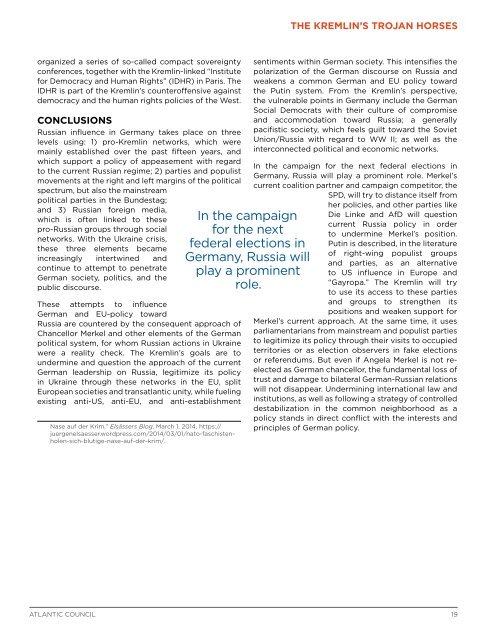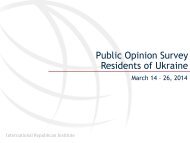Create successful ePaper yourself
Turn your PDF publications into a flip-book with our unique Google optimized e-Paper software.
THE <strong>KREMLIN’S</strong> <strong>TROJAN</strong> <strong>HORSES</strong><br />
organized a series of so-called compact sovereignty<br />
conferences, together with the Kremlin-linked “Institute<br />
for Democracy and Human Rights” (IDHR) in Paris. The<br />
IDHR is part of the Kremlin’s counteroffensive against<br />
democracy and the human rights policies of the West.<br />
CONCLUSIONS<br />
Russian influence in Germany takes place on three<br />
levels using: 1) pro-Kremlin networks, which were<br />
mainly established over the past fifteen years, and<br />
which support a policy of appeasement with regard<br />
to the current Russian regime; 2) parties and populist<br />
movements at the right and left margins of the political<br />
spectrum, but also the mainstream<br />
political parties in the Bundestag;<br />
and 3) Russian foreign media,<br />
which is often linked to these<br />
pro-Russian groups through social<br />
networks. With the Ukraine crisis,<br />
these three elements became<br />
increasingly intertwined and<br />
continue to attempt to penetrate<br />
German society, politics, and the<br />
public discourse.<br />
These attempts to influence<br />
German and EU-policy toward<br />
Russia are countered by the consequent approach of<br />
Chancellor Merkel and other elements of the German<br />
political system, for whom Russian actions in Ukraine<br />
were a reality check. The Kremlin’s goals are to<br />
undermine and question the approach of the current<br />
German leadership on Russia, legitimize its policy<br />
in Ukraine through these networks in the EU, split<br />
European societies and transatlantic unity, while fueling<br />
existing anti-US, anti-EU, and anti-establishment<br />
Nase auf der Krim,” Elsässers Blog, March 1, 2014, https://<br />
juergenelsaesser.wordpress.com/2014/03/01/nato-faschistenholen-sich-blutige-nase-auf-der-krim/.<br />
In the campaign<br />
for the next<br />
federal elections in<br />
Germany, Russia will<br />
play a prominent<br />
role.<br />
sentiments within German society. This intensifies the<br />
polarization of the German discourse on Russia and<br />
weakens a common German and EU policy toward<br />
the Putin system. From the Kremlin’s perspective,<br />
the vulnerable points in Germany include the German<br />
Social Democrats with their culture of compromise<br />
and accommodation toward Russia; a generally<br />
pacifistic society, which feels guilt toward the Soviet<br />
Union/Russia with regard to WW II; as well as the<br />
interconnected political and economic networks.<br />
In the campaign for the next federal elections in<br />
Germany, Russia will play a prominent role. Merkel’s<br />
current coalition partner and campaign competitor, the<br />
SPD, will try to distance itself from<br />
her policies, and other parties like<br />
Die Linke and AfD will question<br />
current Russia policy in order<br />
to undermine Merkel’s position.<br />
Putin is described, in the literature<br />
of right-wing populist groups<br />
and parties, as an alternative<br />
to US influence in Europe and<br />
“Gayropa.” The Kremlin will try<br />
to use its access to these parties<br />
and groups to strengthen its<br />
positions and weaken support for<br />
Merkel’s current approach. At the same time, it uses<br />
parliamentarians from mainstream and populist parties<br />
to legitimize its policy through their visits to occupied<br />
territories or as election observers in fake elections<br />
or referendums. But even if Angela Merkel is not reelected<br />
as German chancellor, the fundamental loss of<br />
trust and damage to bilateral German-Russian relations<br />
will not disappear. Undermining international law and<br />
institutions, as well as following a strategy of controlled<br />
destabilization in the common neighborhood as a<br />
policy stands in direct conflict with the interests and<br />
principles of German policy.<br />
ATLANTIC COUNCIL<br />
19



